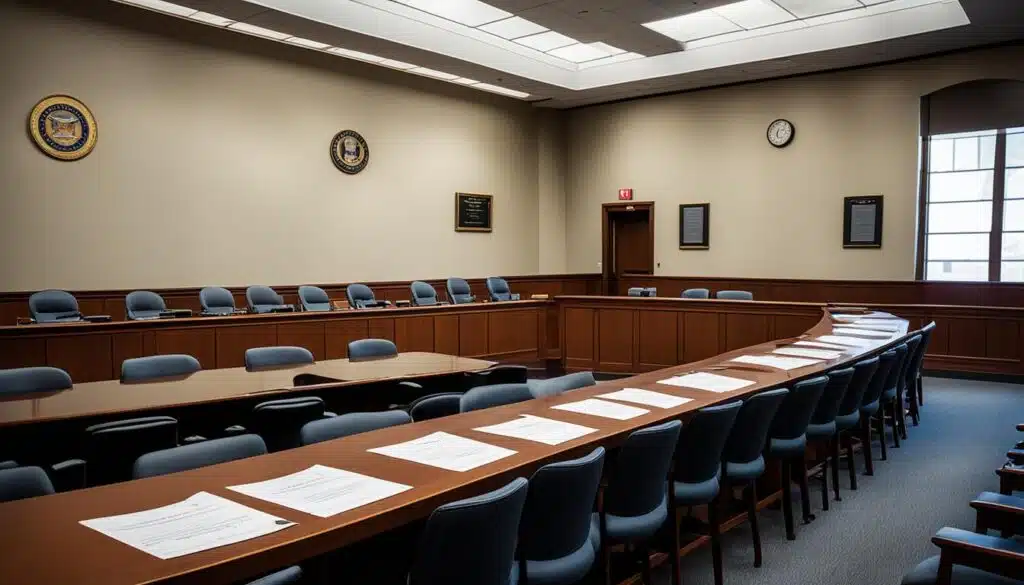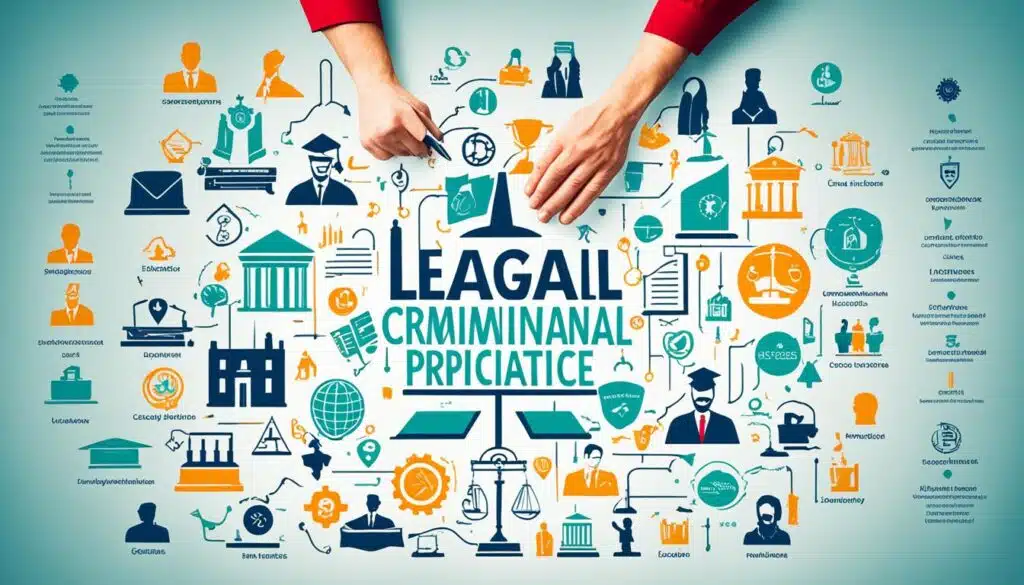Legal education lays the groundwork for a career in law. This guide dives into the world of legal education. It discusses law schools and the legal curriculum. It also talks about key things like clinical programs and moot court competitions.
You’ll learn about getting into law school and how to pay for it. The guide shows how technology changes legal education. Plus, it looks at specializations in legal studies and comparative legal education worldwide. Finally, it explains why getting a legal education is valuable for life.
Key Takeaways
- Legal education gives you the basics for a legal career.
- This guide looks at many parts of legal education, like school structure and the application process.
- It also delves into specialized study areas, practical programs, and how technology changes learning.
- Earning a legal degree opens up many professional opportunities, in law and other fields.
- It includes a look at world legal education, showing how legal work is connected internationally.
Also Read : Understanding Justice In Criminal Law
Introduction to Legal Education
The road to a successful career in law offers many paths. Students from various academic and professional backgrounds can enter the legal field. Some start law school right after their undergrad, while others go later. Whether immediate or delayed, strong preparation for law school is essential.
Paths to Legal Education
Students come from all walks of life and educational backgrounds to the legal field. Some head to law school after their first degree. Others might work or take a break first. The goal is to seize opportunities that boost law school readiness and future legal success.
Preparing for Law School
Getting ready for law school is a varied process. Keeping up with tough classes and a high GPA is key. It’s also important to join pre-law groups and attend events. These steps help you learn more about the legal world and improve your chances. Building your reading, writing, and thinking skills is a must for excelling in law school and as a lawyer.
Importance of Critical Skills
Law school and the legal profession require special skills. Being great at reading, writing, and thinking is crucial for understanding law, research, and writing. These core skills lead to academic triumph and sharp legal minds, critical for advocacy and problem-solving in the field.
Also Read : Top Global PHD Scholarships
The Structure of Law Schools
In the United States, law schools follow a strict path to train future lawyers. They must gain approval from the American Bar Association (ABA). This shows they are top-notch and teach the best legal knowledge.
Accreditation and Approval
For schools to issue valid law degrees, they need to be ABA-approved. This includes checking everything about the school – from its structure to the teaching quality. This approval is key. It lets graduates take the bar exam in many areas, the last step to being a real lawyer.
Faculty and Administration
At the helm of law schools are gifted leaders and teachers. They include deans, associate deans, and famous professors. These experts guide what students learn, manage the school’s day-to-day, and look out for student welfare.
Physical and Online Campuses
Traditionally, law schools have only been found in a physical place. But now, both online and mixed online/in-person schools are gaining ground. These new types of schools give students more choices and easier ways to learn, fitting into their busy lives.
Also Read : Understanding The Legal Education System
Key Components of a Legal Curriculum
The legal curriculum at U.S. law schools aims to give students a full view of the law. It also teaches the skills they need as legal practitioners. This includes both core courses and a lot of different law school electives. These electives let students focus on their favorite parts of law.
Core Courses and Electives
The foundation of a legal education is built with core law courses. They cover important topics like constitutional law and contracts. These classes introduce students to key principles that shape our legal system. Law schools offer many electives too. This allows students to learn more about areas such as intellectual property or environmental law.
Clinical and Experiential Learning
Law schools also focus on clinical legal education and experiential learning. In these, students practice law in real settings. This includes working in legal clinics and taking part in mock trials. These experiences help students learn skills like problem-solving and how to talk to clients.
Legal Writing and Research
Learning to write and research well is key in legal studies. Students practice how to make convincing legal arguments. They also learn how to find legal information effectively. All these skills are very important for any lawyer. Students refine these abilities through classes and practice, getting ready for a career in law.
Also Read : Essential MBA Scholarships For Future Education
The Role of Moot Court and Mock Trials
Moot court and mock trials are a key part of legal education. They help students build their advocacy, research, and public speaking skills. In these events, students argue pretend legal cases, practice speaking, and learn to think and react fast. These are critical for success in the legal field.
Joining moot court and mock trials does more than teach the court system. It hones critical thinking, analysis of legal problems, and how to argue effectively. These real-life learning experiences mirror what legal professionals face, getting students ready for a law career.
These events let students put classroom knowledge to work. They close the gap between learning legal principles and their application. They’re also a chance for students to shine in advocacy. This skill is top-notch for law firms and other legal groups.
The skills students gain in moot court and mock trials stay with them. These events help them understand the legal system better. They learn to stand up for their clients and add value to the legal world.
Also Read : Top MBA Scholarships For Business Students
Legal Education
The path to law school is tough, with lots of competition. Your grades, test scores, what you say about yourself, and who recommends you are all important. It’s key to show you’re good at studying, thinking, and talking. Plus, you really love the law.
Law School Admission Process
Getting into a great law school is hard. They get tons of applications. To stand out, share what makes you unique and why you want to study law. Also, having people vouch for you in recommendation letters is crucial.
Financing Legal Education
Paying for law school is a big deal. Costs for classes and living are high. But, there’s help out there, like scholarships and grants, especially for those who need it most. These can make earning a law degree more affordable.
Diversity and Inclusion Initiatives
Law schools are rooting for more diversity and fairness. They want to see more differences in the people studying law. This includes more people from different economic backgrounds and more women. Schools do this by actively reaching out, providing mentors, and teaching about various experiences.
Clinical Legal Education: Bridging Theory and Practice
Clinical legal education is important for connecting what students learn in theory to real-life cases. By taking part in legal clinics and law school externships, students can help in real cases. They also get to offer legal services to underserved communities and learn firsthand.
Legal Clinics and Externships
These real-life learning chances help students improve their practical skills. They also make students feel responsible for offering pro bono and public service work. This is key in a complete legal education. Students learn a lot by working with pros, like attorneys and judges. They understand the legal system better. They also get better at solving problems and become more confident in facing legal issues.
Pro Bono and Public Service
In clinical legal education, students can really help their communities. By giving free legal help, they get valuable experience. They also help to ensure justice is available for everyone. This kind of public service in law can inspire a lifelong journey of using legal skills for good.
Specializations in Legal Education
Many law schools give students the chance to focus their studies in law areas they find interesting. This can include fields like intellectual property , environmental law , or international lawLegal education specializations help students get ready for specific legal jobs. They allow students to become experts in different fields.
Areas of Specialization
Law schools have many different specializations for students to choose from. Whether someone is interested in corporate law, criminal justice, or healthcare law, there’s something for everyone.
Choosing a specialization helps students learn about the unique legal issues in that field. This makes them more prepared for their future jobs.
Joint Degree Programs
Some law schools offer joint degree programs too. These let students earn a law degree and another advanced degree at the same time. For example, students can get a law degree (JD) and a degree in business or international affairs.
These joint degree programs make students more versatile. It opens up more career paths for them after they graduate.
Concentrations and Certificates
Law schools also have law school concentrations or law school certificates for deeper study in specific legal topics. Students can choose from areas like technology and the law or international human rights.
These options help students gain more in-depth knowledge in their chosen fields. It makes them stand out when they start their careers.
Comparative Legal Education: Global Perspectives
The United States leads the way in how law is taught. Yet, legal education systems around the world do vary. Some schools focus on international law. This means students can learn about human rights and global trade.
Many law schools also promote studying abroad. This gives students real experience in different legal systems and cultures. This global learning helps students see how law connects us all.
International Law Programs
Top law schools understand the need for international law today. They offer special programs in topics like public international law and human rights law. Students get to do things like compete in moot court or do research.
This hands-on learning makes international law clear and exciting. It’s a great way to study law.
Study Abroad Opportunities
Many law schools say it’s important to see the world. They offer study abroad programs. Students can visit schools in different countries. There, they learn about other legal systems and cultures.
These experiences show how law is similar everywhere. They help students be ready for law careers in a global world.
Cross-Border Collaborations
Law schools are working together in new ways, too. They do joint projects and exchange teachers. They even offer degrees from more than one school.
All this brings people from different places together. It helps them share ideas and learn new ways to do law. By doing this, law schools are making a strong, global future for law.
The Impact of Technology on Legal Education
The legal field is changing fast thanks to technology. This shift shows in how legal education is also changing. Now, many law schools offer online and hybrid programs. These make it easier for students to earn a law degree. Thanks to digital learning and video conferencing, students can learn from home or while traveling.
Online and Hybrid Programs
The introduction of online law programs and hybrid law programs has made a big difference. It’s especially helpful for people working or living far from campus. These new study modes let students manage their time better. They can still learn from top-notch teachers and follow a comprehensive legal curriculum.
Legal Technology and Analytics
Along with new ways of studying, law schools are teaching students about legal technology and data analytics. This knowledge is crucial for the tech-focused future of law. Students learn to use tools like e-discovery and AI in their legal work. This makes them more skilled and competitive in the job market.
Digital Resources and Platforms
Technology is changing how law education is experienced and taught. Today, students can use lots of digital resources. These include online legal databases and virtual court practice. It’s preparing them for a tech-filled career. Law students learn important skills in a digital setting. This will help them succeed in the future as attorneys.
Also Read : 10 Books Every Law Student Must Explore
Conclusion
A legal education is key for many career paths, not just in law. It hones critical thinking, research, and communication. People with legal training can tackle tough issues.
This education is valuable in various jobs, not just law. Those with legal backgrounds excel in many areas. They use their skills to help companies and communities succeed.
This guide shows how a legal education can change lives. It talks about law schools, tech, and the impact on jobs. Whether you want to practice law or lead in business, legal education helps you grow.
FAQs
What are the different paths to legal education?
There are many ways to prepare for law school. People from different backgrounds become lawyers. Some start law school right after college. Others go to law school later in life.
How can I prepare for a successful law school application?
To get ready for law school, take hard classes. Keep your grades high. Join pre-law clubs and go to law school events. It’s also good to look at different types of law jobs.
Learning to read well and think hard is key. This helps in both law school and being a lawyer.
What is the structure of law schools in the United States?
Law schools in the U.S. give a tough legal education. They must be approved by the ABA. This makes sure they are high quality.
Deans and professors run law schools. They are experts in law.
What are the key components of a legal curriculum?
At U.S. law schools, students take core classes. They study things like constitutional law and civil procedure. They also take special classes in areas they like.
Law schools also focus on real-world learning. Students work on real cases and get better at writing and researching.
How do moot court and mock trial competitions contribute to legal education?
Moot court and mock trial help law students improve skills they need. These skills include talking in front of others and quick thinking. They are important for being a good lawyer.
What is the law school admission process like?
Getting into law school is tough. They look at your grades, LSAT scores, and more. It can be expensive to study law.
But, many schools help students afford law school. They offer scholarships and other financial help.
How does clinical legal education bridge the gap between theory and practice?
Working in legal clinics helps students see how law works in real life. They help real people. This hands-on experience is very valuable.
It makes students better at their job and helps them care about helping others.
What are the different specializations available in legal education?
Law schools have many areas you can focus on. You can study intellectual property or international law. This makes you an expert in that area.
You can also get a law degree plus another degree. For example, you can get a JD and a business degree.
How does legal education vary globally?
Legal education is different in each country. Some schools focus more on international law. They teach about human rights and global trade.
Many schools also let students study abroad. This helps students understand different legal systems around the world.
How is technology transforming legal education?
Technology is changing how we learn law. Now, you can study law online. This makes it easier for many people to go to law school.
Schools are also teaching students how to use technology in law. This prepares students for the future of law, which is more and more digital.













